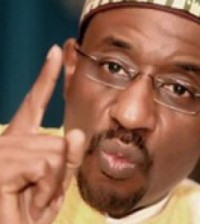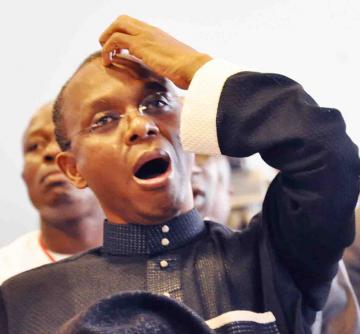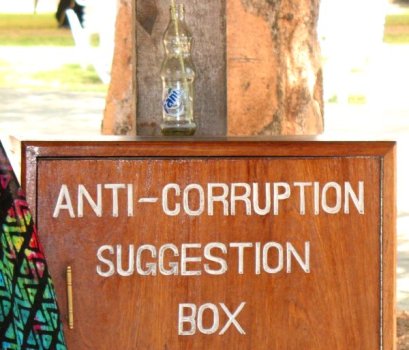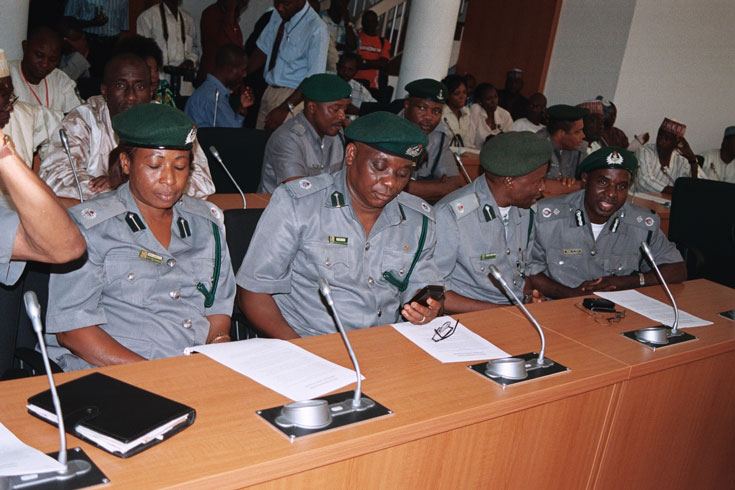Former KBR CEO Stanley Gets 2 1/2 Year Prison Term in Nigerian Bribes Case
Albert “Jack” Stanley, the former KBR Inc. (KBR) chief executive officer, was sentenced to 2 1/2 years in prison for bribing Nigerian officials to win $6 billion in natural gas contracts for the company and its partners.
U.S. District Judge Keith Ellison, who handed down the sentence yesterday in Houston, also sentenced Stanley, 69, to three years of supervised probation.
Stanley pleaded guilty in September 2008 to violating the U.S. anti-bribery law, the Foreign Corrupt Practices Act, and agreed to make restitution of $10.8 million, of which $1.55 million remains to be paid. He faced as long as seven years in prison under the terms of his cooperation agreement.
Larry Veselka, Stanley’s lawyer, asked that his client be sentenced to house arrest instead of prison, saying Stanley’s cooperation resulted in eight felony guilty pleas, four deferred-prosecution agreements and fines of $1.7 billion.
Stanley was “the linchpin, the foundation of the largest, most successful FCPA investigation ever,” Veselka said.
“That’s a double-edged sword,” Ellison replied of the record fines resulting from the Nigerian bribery investigation. “It’s the largest because it was the greatest corruption, wasn’t it?”
Two former consultants for Houston-based KBR who facilitated the scheme also pleaded guilty and have been sentenced for their roles in a plot to bribe Nigerian government officials with $180 million from 1994 to 2004.
Jeffrey Tesler, a 63-year-old U.K. lawyer, was sentenced to 21 months in prison, two years’ supervised release, a $25,000 fine and forfeiture of $149 million earlier yesterday in Houston. Wojciech Chodan, 74, was sentenced Feb. 22 to a year of unsupervised probation and a $20,000 fine.
Defendants Extradited
Tesler, a dual U.K. and Israeli citizen, had faced as long as 10 years in prison and Chodan, who is British, as long as five years under their plea deals. Both men were extradited from the U.K. to face charges in the U.S.
KBR, which was spun off in 2007 from Houston-based Halliburton Co. (HAL), the oilfield services company, agreed in February 2009 to pay $579 million to resolve criminal charges and civil claims by the U.S. Securities and Exchange Commission that it orchestrated a 10-year bribery scheme on behalf of its joint-venture partners in Nigeria’s Bonny Island liquefied natural gas facility.
In June 2010, Paris-based Technip SA (TEC), Europe’s second- largest oilfield services provider, agreed to pay $338 million to avoid prosecution and resolve SEC claims that it, along with KBR, violated the U.S. Foreign Corrupt Practices Act, an anti- bribery statute.
A month later, the Dutch engineering firm Snamprogetti Netherlands BV, a venture partner, agreed to pay $365 million with the help of former parent company Eni SpA (ENI) to settle criminal and civil allegations related to the scheme.
In April 2011, JGC Corp., a Tokyo-based construction and engineering company, agreed to pay a $218.8 million criminal penalty to avoid prosecution for its role.
Nigerian Probe
Nigeria started an anti-corruption probe that resulted in charges against several current and former KBR and Halliburton executives, including former U.S. Vice President Dick Cheney, who was CEO of Halliburton from 1995 to 2000. Halliburton agreed in December 2010 to pay $35 million to settle the allegations, and the charges were dropped.
Stanley asked the judge for leniency, saying he’d been raised on “traditional American values of hard work, honesty and integrity.”
“But somewhere along the way my values were compromised, through ambition, ego or alcoholism,” Stanley said. “Somewhere along the way, I lost touch with Jack Stanley.”
Patrick Stokes, a prosecutor helping lead the Justice Department’s FCPA enforcement push, said while Stanley deserved credit for cooperating, the former KBR chief initially thwarted the investigation.
“Mr. Stanley was the leader of a gigantic fraud” who stole almost $11 million from KBR in a separate kickback scheme, Stokes said. He asked Ellison to give Stanley at least several years in prison to “send a message” to “someone who might be sitting in the corner suite, making decisions to steal money from his company.”
Sympathetic to Stanley
Ellison said he was sympathetic to Stanley and Tesler, both of whom are well-educated, white-collar executives in their 60s. He said he’d seen studies indicating prison is harder and less effective on such defendants than it is on lower-income criminals. There should be a more productive way to use the men’s professional skills to improve society rather than just imprison them, he said at the hearing.
“This case illustrates why we need a better system of incarceration,” Ellison said. He added he was “reluctant” to make distinctions between ordinary street crimes and “the crimes of rich people.”
The judge apologized to Tesler after sentencing him, saying that while he liked the British lawyer “enormously as a human being,” he felt a prison sentence was required to send a message to other executives who might be considering paying bribes to win business in corrupt countries.
“The offense is serious and violations of this magnitude do have consequences,” Ellison said. “The excuse that everybody’s doing it” or the fact that the accused led an otherwise commendable life shouldn’t carry more weight in a white-collar case than in a routine drug bust, he said.
Accepted Business Practice
Ellison questioned defense lawyers whether bribery remains an accepted business practice in Nigeria and whether he should take into consideration the fact KBR’s scheme was largely shut down by the time the U.S. began enforcing the FCPA statute aggressively in 2008.
“It was a fact of life and continues to be a fact of life in Nigeria,” Brad Simon, Tesler’s lawyer told Ellison of widespread bribery in the African nation. “The message wasn’t out there” that the U.S. was intolerant of corruption when this scheme was under way, he said.
“It was a very different world, and people were not conscious of FCPA,” Simon said. “The message is out there loud and clear now.’”
“Don’t you think the message is out there on cocaine and heroin, and we still sentence those people to very long sentences,” Ellison replied.
Stanley and Tesler will remain free on bond until they report to prisons, which the Bureau of Prisons will assign. Tesler’s lawyer said he may ask the court to serve some of his sentence in the U.K.
The cases are U.S. v. Stanley, 08-cr-00597; U.S. v. Tesler, 09-cr-00098; U.S. v. Kellogg Brown & Root LLC, 09-cr-00071; U.S. v. Technip, 10-cr-00439; U.S. v. Snamprogetti Netherlands, 10- cr-00460; and U.S. v. JGC Corp. (1963), 11-cr-00260, U.S. District Court, Southern District of Texas (Houston).









Mystic_mido
February 24, 2012 at 9:34 am
Where the Nigerian Corrupt partners dey…in Government office or receiving OFR. Shame on you; Nigerian leaders and elders who watch while everything go sour!